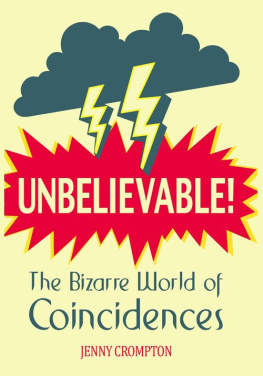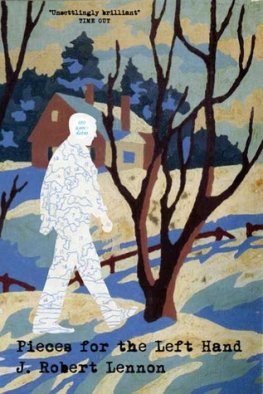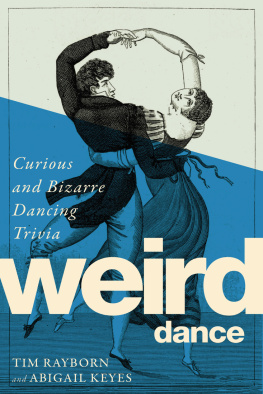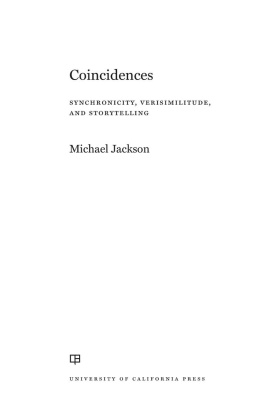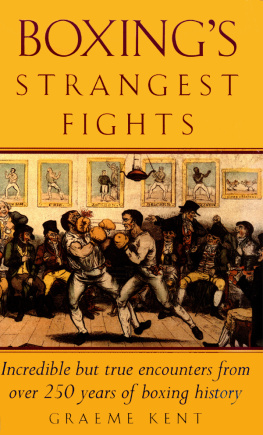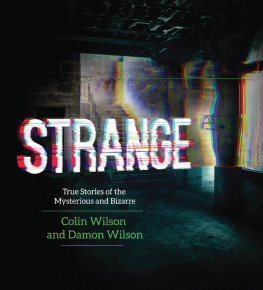
CONTENTS
Cheating Death
What are the Odds?
Good Timing
Eureka!
A Series of Unfortunate Events
Terrible Timing
A Moment of Madness
Keeping It in the Family
Not the First Time
You Again
Separated at Birth?
A Date With Destiny
May the Best Man Win
Divine Dispatches
Thatll Be 10 Per Cent, Thanks
Doomed to Failure
Unlucky 13
Paranormal Places
Nostra-Damned-Us
Peculiar Prophecies
The Printed Word
Weird History
Political Paranoia
Curiouser and Curiouser
Stranger than Fiction
You Couldnt Make it Up
Priceless Possessions
Where Did You Last See It?
It is Written
Incoming
Family Fortunes
The Course of True Love
Back from the Dead
No coincidence, no story.
CHINESE SAYING

C OINCIDENCES make the best stories.
Listen carefully next time youre at a dinner party and youll notice how many anecdotes start Ive had the most ridiculously unlucky day or Youll never be lieve who we ran into at that dodgy motel or Did you know Hitler almost became an artist rather than a psychopath? to be met by a chorus of What are the odds? and How weird! and everybody trying to outdo each other with ever more improbable yarns. Skimming just the top of my own greatest hits: Ive bumped into an old school friend in the Australian Outback, checked into the wrong hotel room because the rightful occupant shared my name, discovered in the course of casual chitchat that my boss was the son of my university professor, and narrowly avoided being involved in a terrorist incident because I was horribly hung over and late for work. (The latter arguably less of a coincidence than a lifestyle choice.) Coincidences are all around us, if only we can find the link that transforms two unrelated and often uninteresting circumstances into an incredible tale.
Depending on your disposition and your level of involvement in the story, coincidence has any number of alter egos: irony, conspiracy, karma, fate, destiny, good or bad luck, premonition, divine intervention, or just plain old Sods Law. Via lottery wins, lucky guesses and survival against the odds, coincidence has a hand in everything from the unlikely victory of Harry, England and Saint George in Shakespeares Henry V to poor old Alanis Morissettes unexpected windfall of 10,000 spoons when the one thing she needs is a sodding knife.
But are coincidences just tenuous man-made connections or is there anything more profound at work? Without doubt we love to interpret them as meaningful rather than random: ask people who consider themselves lucky and youll find their own strings of happy coincidences are a sign that someones watching out for me; less fortunate people, on the other hand, will likely seize on every new misadventure as yet further proof that they are nothing but the playthings of cruel Fate.
The philosopher and psychologist Carl Jung certainly thought there was something to it all, developing in the early 1950s his theory of synchronicity: the simultaneous occurrence of events that appear significantly related but have no discernible causal connection, or, in plain English, the grouping together of events by meaning rather than by cause (see for one of his own examples). Jungs studies on the matter veer into the overly technical for our purposes here, but on a day-to-day level we all experience these seemingly meaningful coincidences: thinking about someone just as they inexplicably round the corner, reading a word in a book at the same moment it appears in the lyrics of a song on the radio, idly daydreaming about spending imaginary millions just seconds before discovering were the sole inheritor of a mystery great-aunts vast estate The most cynical of people would be hard pressed not to think It must be a sign.
Of course, seeking the hidden meaning behind every coincidence is what leads us into the realms of curses and conspiracy theories, or the near-universal fear of the number 13. Nary a major world event, from a celebrity death to an election win, can go by these days without a sizeable faction pointing to seemingly incidental circumstances as proof of a secret plot. (By the way, did you know Michael Jackson was buried on the anniversary of his will being signed? Did you know most United States presidents are left-handed? Mighty strange, thats all Im saying )
Coincidences are, above all, cracking stories, and alongside the spooky, scary and downright suspicious, this book celebrates the bizarre and funny ones, too: long-lost lovers, godsends that quite literally fall from the heavens, and the weird and wonderful workings of the cosmic lost-property cupboard. Hundreds of tales from all over the world that are so unbelievable they must be true.

The most astonishingly incredible coincidence imaginable would be the complete absence of all coincidences.
JOHN ALLEN PAULOS

T HE best coincidences are those that end happily: saved lives, lottery wins, chance encounters and inadvertent brainwaves. From finding yourself in the right place at the right time to realizing youve had a fortunate escape, the lighter side of luck is a joy to behold.
Twenty-four hours in a day; twenty-four beers in a case. Coincidence?
STEVEN WRIGHT

CHEATING DEATH
While some people seem to court calamity as the next chapter amply proves others seem simply to toy with it before making a lucky escape. Again and again and again

N INE L IVES , P LUS F IVE
Pensioner Alec Alder was dubbed Britains luckiest man after it was revealed that he had cheated death not once but fourteen times.
Alders first encounter with the Grim Reaper was at the age of seven, when he fell out of a fifteen-foot tree. Three years later, aged ten, he was hit by a car while out cycling. The head-on collision sent him flying into the air and onto the bonnet, but as luck would have it the driver was a doctor and was able to give him immediate medical assistance.
At the outbreak of World War II, Alder was due to be shipped off to France but was given a few days leave to get married, after which he was sent on a different mission on home soil.
My old company went off to Dunkirk, he later recalled. All my friends got killed and I should have been with them.
The war was not to be entirely uneventful for him, though. He was bombed twice in 1940, and in 1942 he was run over by a tank during training; thanks to heavy rain it merely pushed his foot and leg into the mud before miraculously stalling inches from his head. That same year, a British fighter plane crash-landed on the Devon house in which Alder was visiting relatives, bursting into flame and causing the roof to collapse into his bedroom.
Having somehow reached the end of the war alive, despite further near-death encounters on the high seas and in Burma, his ship home almost sank in a terrible storm off the coast of Gibraltar. He made it back to Britain, where he subsequently survived three horrifying near-misses in his car before dying of natural causes at the ripe old age of eighty-eight.
Next page
